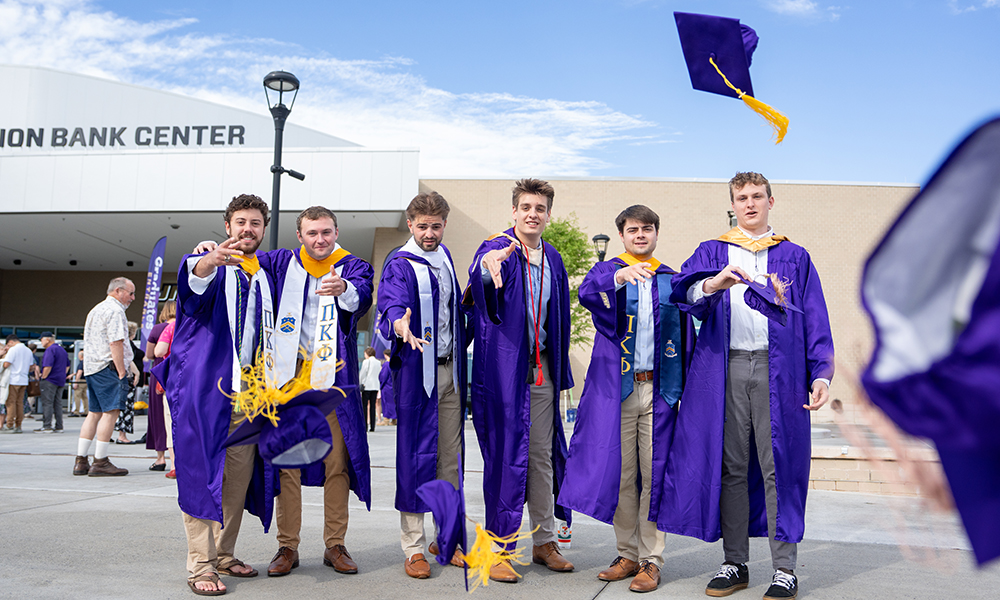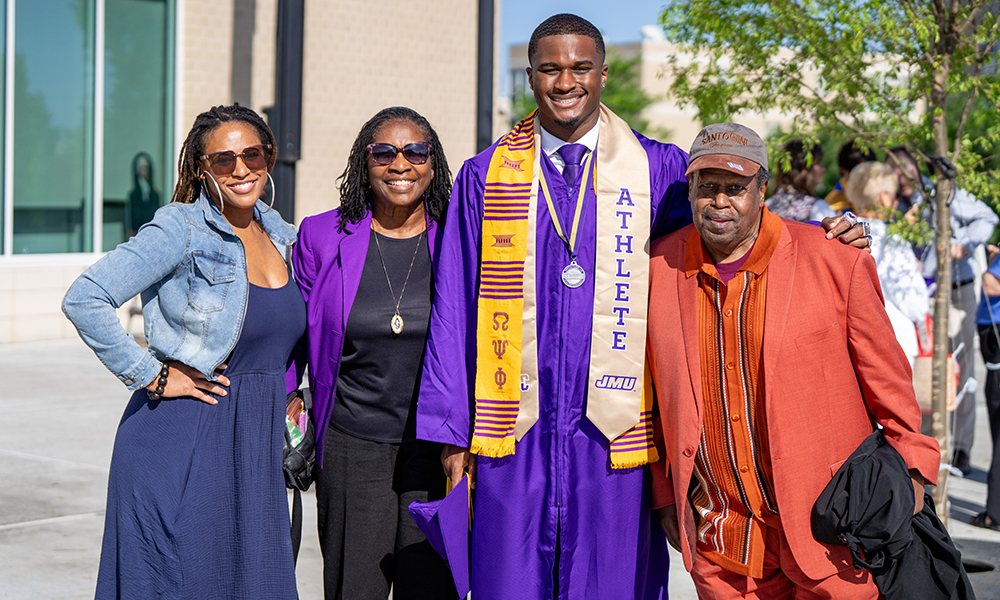Commencement brings joy and the desire for more
News
SUMMARY: Speaker urges graduates to seek roles and vocations that engender both the joy of having and the desire for more.
Nearly 900 James Madison University undergraduates crossed the stage to receive their diplomas on May 17 when the College of Business held its Spring 2025 graduation ceremonies in the Atlantic Union Bank Center.
Among them were 670 who had completed one or more of the CoB's seven undergraduate majors and 205 students who had satisfied the requirements for graduation from the Hart School of Hospitality, Sport and Recreation Management.
Almost 100 others who earned advanced degrees from CoB specialty programs were recognized at separate ceremonies around the campus on graduation weekend.
 At the outset of his welcoming remarks, Michael Busing, dean of the College of Business, invited all in attendance to join him in recognizing Jake Ross, an Accounting and Political Science double major, as this year's valedictorian. Holding up Reed as a paradigm, Busing encouraged graduates to “keep dreaming and following your passion.”
At the outset of his welcoming remarks, Michael Busing, dean of the College of Business, invited all in attendance to join him in recognizing Jake Ross, an Accounting and Political Science double major, as this year's valedictorian. Holding up Reed as a paradigm, Busing encouraged graduates to “keep dreaming and following your passion.”
“By doing so,” he said, “you will lead a productive and meaningful life and positively impact those around you."
Busing reminded graduates of a courtesy that has become one of the distinguishing marks of JMU's culture of caring. Our alumni are famous, said Busing, for reaching back to open doors for those who come after them. “I urge you to continue this tradition,” he said.
Next to the podium was Charlie King, JMU's outgoing interim president. Prior to his assumption of that post in 2024, King served for 25 years as the university’s senior vice-president of administration and finance – a period during which the campus expanded dramatically, and its national reputation soared.
No matter what their discipline or specialty, he told the graduates, they would leave the JMU campus “equipped to be the change” in the world and in the local community.
“I encourage you to carry,” King said, “the values this institution holds dear – integrity, curiosity and a commitment to making a positive impact. … your actions can create ripples of change that extend far beyond your immediate surroundings.”
 King was followed by Carl Larsson, an associate professor of Finance and Blue Ridge Bank Faculty Fellow, who has been a member of the JMU College of Business faculty since 2016.
King was followed by Carl Larsson, an associate professor of Finance and Blue Ridge Bank Faculty Fellow, who has been a member of the JMU College of Business faculty since 2016.
Larsson was the recipient last year of the Dr. Otto C. Brenner Memorial Award, which signified his having been named — by a vote of students — the College of Business’ “outstanding undergraduate professor.” He had previously been honored in 2020 with the provost’s “Distinguished Teacher Award.”
In the preamble to his speech, Larsson invited graduates to ponder for a few minutes what is perhaps the most momentous question of all – “Life is short, and we only have one life to live … how will you live yours?”
Larsson listed three related questions he once heard posed by one of his own undergraduate mentors, the late theologian Michael Himes of Boston College:
What gives you joy?
What are you good at?
Does anyone need you to do it?
Himes’s belief, according to Larsson, was that by considering these three questions, graduates would be guided toward roles and vocations (including career paths in business) that would enable them to become as fully human as it is possible to be.
Taking up the first question, Larsson said that, through his use of the word “joy,” he meant to imply something “deeper and more central” than mere happiness. “It isn’t so much about feeling,” he said, “as something you seek out and step into.”
True joy, Larsson said, “comes from things that, when you possess them, leave you hungry for even more.” This is different from being content and satisfied. Instead, he said, graduates should be asking themselves, “What is it that propels you forward and challenges you to grow your skills, to be the best you can be?”
Feedback from others is indispensable to discovering an answer to the second question, “What are you good at?” Friends, relatives and other trusted members of a personal network can help point out these things. Even more crucially, they can be of assistance in identifying the things a person is not as good at.
“It’s important,” said Larsson, “to seek out true, honest feedback from others, and to receive it with humility and an openness towards learning about your strengths and weaknesses.”
 The third and final question that comes into play in the discernment of careers and other roles in life is asking oneself, “Does anyone need you to do it?”
The third and final question that comes into play in the discernment of careers and other roles in life is asking oneself, “Does anyone need you to do it?”
Larsson assigned supreme importance to this question because it sets the stage for decisions about how to give away talents and gifts in ways that improve the lives of other people. While difficult, such decisions are also a source of true joy. Larsson said he is convinced, in fact, that graduates will not be able to take full ownership of the fruits of their education until – paradoxically enough – they give them away in service to the larger community.
Larsson brought his remarks to their conclusion by urging graduates to seek roles for themselves that best fit all three criteria. See if you don’t discover in the process, he said, that it results in a life which feels more fully alive – more fully human.
